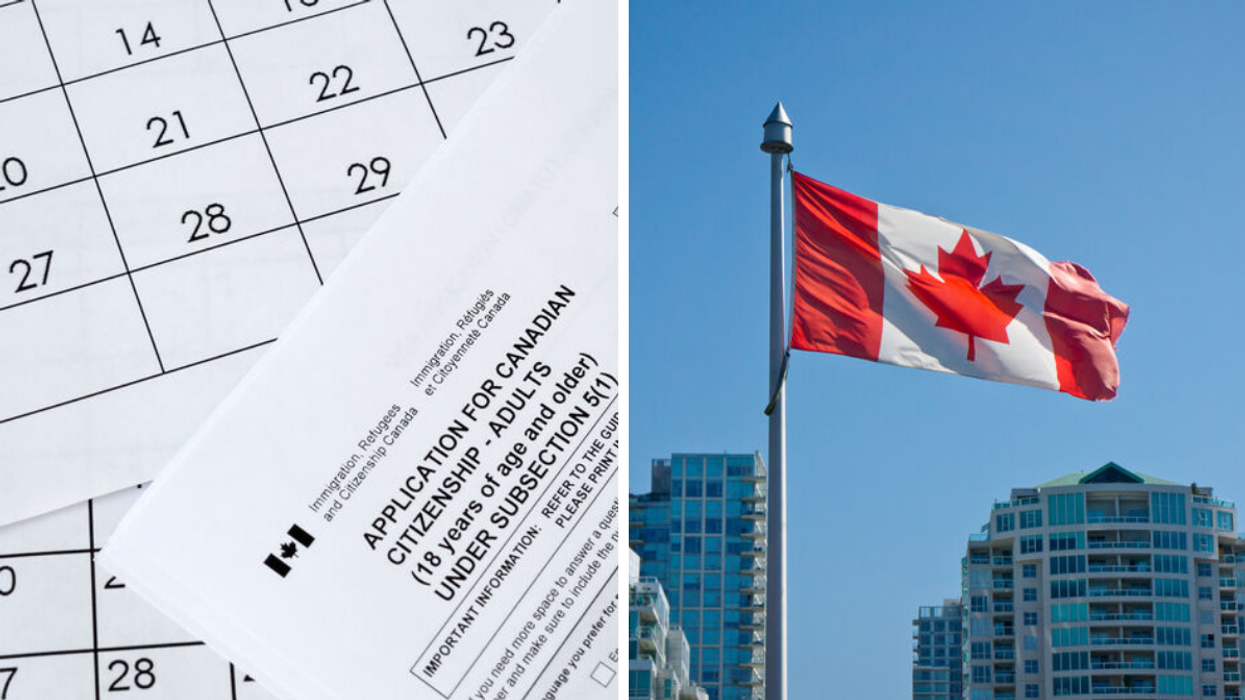6 Reasons Your Canadian Citizenship Application May Be Rejected, According To An Expert
Watch out for these really common mistakes. 👇

A Canadian citizenship application. Right: A Canadian flag.
Applying for Canadian citizenship is undoubtedly a momentous step for any newcomer to Canada who wants to permanently call this country home.
While the process is definitely exciting, it can also be nerve-wracking because your Canadian citizenship application can be rejected.
Narcity recently spoke to Franklin Rodriguez, a regulated Canadian immigration consultant who runs Mi Casa Canada Immigration Services, to get an insight into the process and how applicants can give themselves the best shot of being approved.
It turns out, according to Rodriguez, it's actually very easy to have your application rejected, and it's often because of small, fixable issues.
Here are some of the most common reasons that your application might be rejected and what you can do to avoid them.
Applying too early
For an applicant to attain citizenship, they need to have been physically present in Canada for at least three of the five years before submitting their application — that's 1,095 days in total.
However, a lot of applicants confuse the time required to maintain their status as a permanent resident (730 days) with the time requirements to become a citizen (1,095 days).
Bottom line? "You must do some math to calculate and meet your citizenship time requirements accurately," said Rodriguez.
Not having proof of language skills
"To be granted Canadian citizenship, you must meet the Canadian Language Benchmarks Level 4 (CLB 4) or higher in speaking and listening," Rodriguez told Narcity.
This shouldn't be a hard one because, when people become permanent residents, they are usually required to do a language test anyway.
So, a handy tip would be to keep the result of this language test on record, even if it has expired.
"You could give those same results to prove your language abilities," advised Rodriguez.
"Otherwise, you will need to provide different documents to show that you meet the CLB 4, which can be harder to get and delay your application."
Failing the citizenship test
Hey, the Canadian Citizenship test is not one to be taken lightly!
The test has 20 multiple-choice and true-or-false questions that delve into Canada's history, geography, economy, government, laws and symbols.
Applicants have to answer at least 15 questions correctly to pass, which means they have to score 75% or higher.
"If you fail the test, IRCC will reschedule you for a second attempt, given you meet all the other requirements," Rodriguez explained.
"If you are unsuccessful the second time, an oral hearing will be scheduled to access your knowledge; not passing your oral hearing means IRCC will refuse your application," he said.
That being said, all is not lost.
"You can re-apply for citizenship, and you will have to attempt the exam again," he added.
Not having filed taxes
Taxes are a must in Canada, and applicants need to have filed taxes for three years before they can apply for Canadian citizenship.
"The easiest way is to give IRCC authorization to contact CRA to verify you have filed your taxes and meet the requirement," said Rodriguez.
"Otherwise, you will need to personally submit evidence that you have submitted your taxes."
Skipping the citizenship ceremony
All applicants aged 14 years or older have to take Canada's Oath of Citizenship during their citizenship ceremony.
But what many might not know is that you absolutely have to be in the country to do this.
"During COVID, the government has held virtual citizenship ceremonies, but the applicant needs to be in Canada," Rodriguez explained.
"Suppose you are outside of Canada and are scheduled for your ceremony. In that case, you need to return to Canada and attend your ceremony from inside the country or reschedule your interview for a later time when you are in Canada."
Having a criminal record
This one is very important.
"If you commit a crime in or outside Canada, Canada might bar you from becoming a Canadian citizen for some time or even permanently," Rodriguez said.
Being caught driving with blood alcohol over the acceptable level is one such example. So, be mindful that you are following all the rules and laws of the country you are in.
Rodriguez also pointed out that, to apply for Canadian citizenship, you need to be a permanent resident first. So, if you don't have permanent residency, there's really no point in applying for citizenship just yet.
If your citizenship application is rejected, the resulting immigration letter should provide insight into the reason for rejection.
Based on that, you can reapply for citizenship, granted you've solved the issue that led to you being rejected during the first attempt.
The good news is that "no time has to go by before you can try resubmitting again," according to Rodriguez. "You can submit a new application at any time."
But if for example, you got rejected because you did not complete your 1,095 days within the country, you can re-apply after you have finished that time period.
In any case, it's always a good idea to contact an immigration expert, especially if you're unsure of what you did wrong in the first place.
Good luck, newcomers!
This article's cover image was used for illustrative purposes only.
- Immigrating To Canada Can Be Expensive & Here Are The Fees You Need To Be Mindful Of ›
- 4 Big Benefits Of Having Permanent Resident Status In Canada & How You Can Get It ›
- Canada Wants To Welcome Over 1 Million New Permanent Residents & These Skills Are In Demand ›
- What To Do If Your Canadian Citizenship Application Is Rejected, According To An Expert - Narcity ›